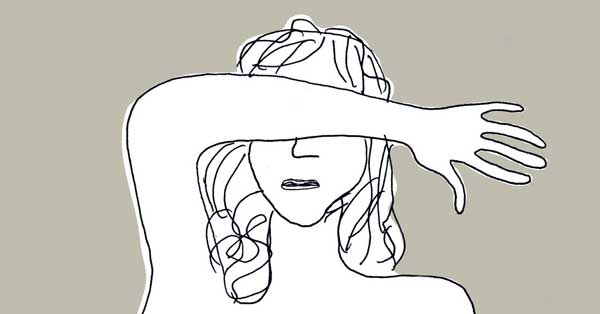多愁善感不是病
Medicating Women’s Feelings
多愁善感不是病
WOMEN are moody. By evolutionary design, we are hard-wired to be sensitive to our environments, empathic to our children’s needs and intuitive of our partners’ intentions. This is basic to our survival and that of our offspring. Some research suggests that women are often better at articulating their feelings than men because as the female brain develops, more capacity is reserved for language, memory, hearing and observing emotions in others.
女性往往情绪化。通过进化的设计,我们天生对环境敏感、能感同身受地理解孩子的需求、能直观地感知伙伴的意图。这是我们自身和后代生存的基本要素。有些研究显示,与男性相比,女性往往更擅长表达自己的感情。因为女性大脑发育的过程中,有更多容量留给了语言、记忆、听觉和观察他人的情绪。

These are observations rooted in biology, not intended to mesh with any kind of pro- or anti-feminist ideology. But they do have social implications. Women’s emotionality is a sign of health, not disease; it is a source of power. But we are under constant pressure to restrain our emotional lives. We have been taught to apologize for our tears, to suppress our anger and to fear being called hysterical.
这些是植根于生物学的观察结果,并不是为了迎合任何女权主义或反女权主义的思想。但是,它们的确产生了一些社会影响。女性的情绪是健康而非疾病的标志,是力量的来源。但是,我们经常面临需要控制情感的压力。人们叮嘱我们要为自己的眼泪道歉、要克制愤怒,而且要担心被人形容歇斯底里。
The pharmaceutical industry plays on that fear, targeting women in a barrage of advertising on daytime talk shows and in magazines. More Americans are on psychiatric medications than ever before, and in my experience they are staying on them far longer than was ever intended. Sales of antidepressants and antianxiety meds have been booming in the past two decades, and they’ve recently been outpaced by an antipsychotic, Abilify, that is the No. 1 seller among all drugs in the United States, not just psychiatric ones.
制药行业利用了这种恐惧,在日间脱口秀节目和杂志上投放了大量针对女性的广告。目前,服用精神药物的美国人比以往任何时候都多,而且根据我的经验,他们的服药期限也远远超过了预期的时长。过去20年,抗抑郁和抗焦虑药物的销量一直在激增;最近,抗精神分裂药安律凡(Abilify)的销量超过了这两者。它是美国所有药物,而不仅仅是精神药物中销量最高的。
As a psychiatrist practicing for 20 years, I must tell you, this is insane.
作为一个行医20年的精神科医生,我必须告诉你,这简直是疯了。
At least one in four women in America now takes a psychiatric medication, compared with one in seven men. Women are nearly twice as likely to receive a diagnosis of depression or anxiety disorder than men are. For many women, these drugs greatly improve their lives. But for others they aren’t necessary. The increase in prescriptions for psychiatric medications, often by doctors in other specialties, is creating a new normal, encouraging more women to seek chemical assistance. Whether a woman needs these drugs should be a medical decision, not a response to peer pressure and consumerism.
如今,美国至少有四分之一的女性都在服用精神药物,而男性仅有七分之一。女性被诊断患有抑郁症或焦虑症的可能性几乎是男性的两倍。对于很多女性来说,这些药物极大地提高了她们的生活品质,但对另一些人而言却并无必要。医生开的精神药物越来越多,开药的往往是其他领域的医生,这创造了一种新常态,鼓励更多女性去寻求化学支持。一名女性是否需要这些药物,应该是一个医疗决定,而不是对同辈压力和消费主义的回应。
The new, medicated normal is at odds with women’s dynamic biology; brain and body chemicals are meant to be in flux. To simplify things, think of serotonin as the “it’s all good” brain chemical. Too high and you don’t care much about anything; too low and everything seems like a problem to be fixed.
这种用药的新常态不符合女性动态的生物学属性;大脑和身体的化学物质原本就应该波动不定。为了简化问题,请想象血清素是产生“一切都很好”这种感觉的大脑化学物质。如果它的水平太高,人们就会什么都不在意;如果太低,那么一切似乎都是需要解决的问题。
In the days leading up to menstruation, when emotional sensitivity is heightened, women may feel less insulated, more irritable or dissatisfied. I tell my patients that the thoughts and feelings that come up during this phase are genuine, and perhaps it’s best to re-evaluate what they put up with the rest of the month, when their hormone and neurotransmitter levels are more likely programmed to prompt them to be accommodating to others’ demands and needs.
在月经即将到来的日子里,女性的情绪敏感度会提高,女性可能更容易受到外部影响,更焦躁或更容易感到不满。我告诉我的患者,这个阶段产生的想法和感觉是真实的,或许应该重新评估她们在一个月的其他时间里忍受的事情——那个时候,她们的荷尔蒙和神经递质所处的水平,更倾向于促使她们迁就他人的诉求和需要。
The most common antidepressants, which are also used to treat anxiety, are selective serotonin reuptake inhibitors (S.S.R.I.s) that enhance serotonin transmission. S.S.R.I.s keep things “all good.” But too good is no good. More serotonin might lengthen your short fuse and quell your fears, but it also helps to numb you, physically and emotionally. These medicines frequently leave women less interested in sex. S.S.R.I.s tend to blunt negative feelings more than they boost positive ones. On S.S.R.I.s, you probably won’t be skipping around with a grin; it’s just that you stay more rational and less emotional. Some people on S.S.R.I.s have also reported less of many other human traits: empathy, irritation, sadness, erotic dreaming, creativity, anger, expression of their feelings, mourning and worry.
最常见的抗抑郁药——这些药也用于治疗焦虑症——是选择性血清素再摄取抑制剂(selective serotonin reuptake inhibitors,简称SSRI),它能强化血清素的输送。SSRI让你感觉“一切都好”。但太好也不是好事,较多的血清素可能会让你更加冷静、抑制恐惧感,但也可能会让你变得麻木,身体和情感上皆是如此。这些药物经常会压抑女性对性生活的兴趣。SSRI倾向于钝化消极情绪,而非激发积极情绪。在服用SSRI时,你可能不会面带笑容地四处蹦跳,而只是会变得更加理性,不那么情绪化。一些服用SSRI的人也曾透露,其他许多人之常情也减少了,诸如同理心、恼火、悲伤、性梦、创造力、愤怒、哀痛、担忧,以及自身情绪的表达。
Obviously, there are situations where psychiatric medications are called for. The problem is too many genuinely ill people remain untreated, mostly because of socioeconomic factors. People who don’t really need these drugs are trying to medicate a normal reaction to an unnatural set of stressors: lives without nearly enough sleep, sunshine, nutrients, movement and eye contact, which is crucial to us as social primates.
很明显,有些情况是需要精神药物的。问题是,有太多真正患病的人仍未得到治疗,这多半是因为社会经济因素。那些并非真正需要这些药物的人,则试图通过服药,让自己对一系列反常的压力来源做出正常的反应,诸如严重缺乏睡眠、阳光、营养、运动和眼神接触——这对人类这种社会性灵长目动物至关重要。
If the serotonin levels of women are constantly, artificially high, they are at risk of losing their emotional sensitivity with its natural fluctuations, and modeling a more masculine, static hormonal balance. This emotional blunting encourages women to take on behaviors that are typically approved by men: appearing to be invulnerable, for instance, a stance that might help women move up in male-dominated businesses. Primate studies show that giving an S.S.R.I. can augment social dominance behaviors, elevating an animal’s status in the hierarchy.
如果女性的血清素水平一直处在人为提高的状态,她们可能就会丧失情绪的敏感度及其自然波动,进而形成一种更男性化的、平稳的激素平衡。这种情绪上的钝化,会促使女性做出通常被男性认可的行为举止,例如表现得无坚不摧,这种姿态可能有助于女性在男性主导的商业领域向上走。灵长目动物的研究表明,SSRI能增强社会支配行为,提高动物在社会阶层中的地位。
But at what cost? I had a patient who called me from her office in tears, saying she needed to increase her antidepressant dosage because she couldn’t be seen crying at work. After dissecting why she was upset — her boss had betrayed and humiliated her in front of her staff — we decided that what was needed was calm confrontation, not more medication.
不过,这么做要付出什么代价?有一个患者曾经流着泪从办公室打电话给我,说她需要加大抗抑郁药的剂量,因为她不能在工作场所让人看到自己哭。我们分析了她伤心的原因——她的老板在她的下属面前揭她的丑并羞辱了她——随后得出结论,她需要做的是冷静地对抗,而不是服用更多药物。
Medical chart reviews consistently show that doctors are more likely to give women psychiatric medications than men, especially women between the ages of 35 and 64. For some women in that age group the symptoms of perimenopause can sound a lot like depression, and tears are common. Crying isn’t just about sadness. When we are scared, or frustrated, when we see injustice, when we are deeply touched by the poignancy of humanity, we cry. And some women cry more easily than others. It doesn’t mean we’re weak or out of control. At higher doses, S.S.R.I.s make it difficult to cry. They can also promote apathy and indifference. Change comes from the discomfort and awareness that something is wrong; we know what’s right only when we feel it. If medicated means complacent, it helps no one.
通过病例审阅可以明显看出,相比之下,医生给女性患者开精神治疗药物的可能性更大,尤其是35岁到64岁的女性。对于这个年龄段的一些女性来说,她们的更年期症状听起来可能很像抑郁症,而且爱哭是普遍现象。哭泣不全是因为悲伤。当我们感到恐惧或受挫、目睹不公,或是被人类的苦难深深触动时,我们都会流泪。此外,有些女性格外爱哭。这并不意味着我们感情脆弱或处于失控状态。高剂量的SSRI让哭泣变得困难,它们还会让人更加冷漠和无动于衷。只有我们感到不舒服,或意识到什么地方不对劲,才会做出改变;我们通过感知来判断对错。如果药物让人变得漠然,对任何人都没好处。

